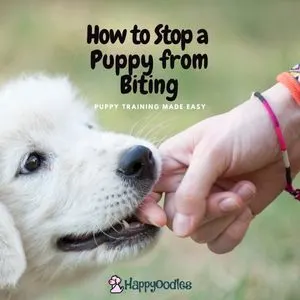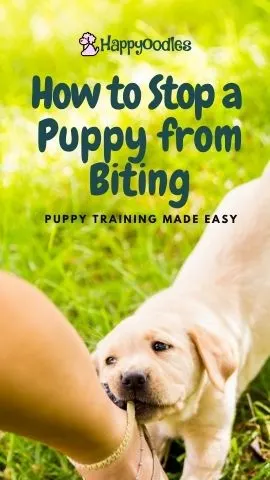Updated 12/06/2023: Ah, puppies – they’re just irresistible, aren’t they? With their squishy little bellies, those big, soulful eyes, and fur softer than the fluffiest cloud, it’s like they’re custom-made for endless cuddles. But then, there’s the biting. Ever felt like your adorable furball is part piranha in disguise? Yep, those tiny teeth can be surprisingly sharp!
Don’t worry, you’re definitely not alone in this. The truth is, all puppies go through a biting phase. It’s their way of exploring the world around them, kind of like toddlers who put everything in their mouths. They’re not just being cheeky – it’s all part of growing up in the doggy world.
But, of course, it’s up to us to gently show them that human skin isn’t quite the same as their chew toys. Ready to dive into the world of puppy biting and figure out how to navigate this nippy stage? Let’s get started and learn how to turn those playful bites into polite nibbles.
Why do puppies bite?
Puppies bite for a few reasons; Teething, playing, and exploring are the most common reasons a puppy will bite.

Understanding why your puppy is biting can help with training your puppy not to bite. Let’s start with a deeper dive into why your puppy may be biting then we will move onto how to stop a puppy from biting.
Teething
The most common reason a puppy will bite is teething. Teething happens when their puppy teeth break through the gums and again when their adult teeth push through.
Just like with babies, teething hurts and your puppy is looking for something to relieve the pain. It just so happens that our soft fleshy skin with the hard bone beneath, are the perfect combination to relieve the pain and pressure they feel.
My husband’s meaty finger was our son’s favorite teething ring too. Puppy teething tends to be at its worst between 1 to 8 weeks and again at 4 to 6 months, though a puppy that is not properly trained may continue biting long after all their adult teeth have come in.
Teething not only causes puppy biting but also puppy chewing. For ways to stop your puppy’s unwanted chewing read: How to Stop Your Puppy’s Destructive Chewing
Playing
Another reason puppies bite is because it is a natural form of play. Puppies will play bite while they are learning how to exert their dominance.
Occasionally a puppy will become over excited and bite excessively. When this happens with their siblings, the bitten pup will either cry out in pain or bite back. If a puppy bites an adult dog, that dog may growl in response.
All these reactions tell the puppy that biting others is not allowed. As humans we generally don’t bite or growl therefore the normal social clues are not given. This can lead the pup to think that biting is allowed.
Exploring
Puppies also use their mouths to explore the world since they don’t have hands. When puppies use their mouths to explore us, we call this mouthing.
The difference between mouthing and biting is that with mouthing they don’t close their jaws or inflict pain. Again, it is up to you to teach your pup the proper use of their mouths.
How to stop a puppy from biting
As I mentioned previously, puppies start learn about biting when they are still with their canine families. Based on the reaction of the dogs around them, they learn when they can bite and when they can’t. You need to continue this early canine training when they join your family.
“Ouch”
The most common recommendation on how to stop a puppy from biting is to teach your puppy that biting hurts you. If you have bonded with your puppy they will not want to hurt you.
You can do this by letting out a firm “ouch” when they bite. Do not yell too loud or in a whinny pitch for the sound might cause your pup to become excited and bite more. The first time you do this your puppy should look surprised and may even lick you.
Redirect
As soon as they stop biting you want to redirect their biting by giving them a suitable object that they can bite and chew.
This will teach your pup that there are acceptable chew items that are not your hands. You will need to repeat this process multiple times before your puppy learns what is ok to bite and chew on.
It’s important to have a variety of toys available for your puppy to play with.
Just remember no toy is indestructible. Puppies should be supervised when playing with any toys to prevent injury.
This technique works well for a puppy that is teething, since they are just looking to soothe their sore gums, not hurt you.
But for a puppy that is play biting it may not work as well. It didn’t work for our newest puppy Bella.
We found that if we continued to play with her after saying “ouch” she just thought it was part of the game.
Plus, she seemed to get excited by the whiny “ouch”. She is part Rat Terrier so it may be part of her instincts as a ratter.
As an Amazon Associate I earn from qualifying purchases.
Stop playing
Instead of redirecting her to a toy we stopped playing with her. For us, this approach worked the best.
Just like with the redirect method as soon as your puppy bites you again say “ouch” again in a firm voice then stop playing with them.
If your pup is in a safe place walk away and leave them alone. If they are not in a safe place move them to a safe place and leave them alone for about 3 minutes.
Do not talk to them while placing them in the safe place. This will teach your pup that biting is not allowed and playtime will stop whenever they bite.
Puppies are very social so they will not like that they are alone.
Do not to use your dog’s crate for timeouts. They may start to associate the crate with being punished. Instead use an exercise pen or safety gates to secure your puppy in a safe place.
Make sure to puppy proof your home. It only takes a second for a puppy to find trouble. There are many dangers in your home that you may not think of. To learn more read: Puppy Proofing your Home: 10 Silent Dangers.
After the 3 minutes is up you can go back to playing. Make sure to give your pup a toy as soon as you start to play. If your pup bites again repeat the process.
Longer time out
Depending on your pup you may need to leave them alone in their confined safe space longer than 3 minutes.
Do not take your pup out of their confined space until they have calmed down. Sometimes puppies that are biting excessively are just over tired and need down time to rest and unwind.
Never let your pup out of their confined safe space if they are crying or barking. This will only teach them to do these behaviors when they want to get out.
The key is consistency
The key to both ‘ouch” methods working are to be consistent. If you allow them to bite you sometimes but other times you say “ouch” and redirect or leave, your puppy will never learn what you expect of them.
The same message needs to be repeated by all family members. Have a family meeting and make sure everyone knows what to do and why.
The Puppy Blues – Dealing with a new puppy can be hard, especially if you are a first time puppy parent. You might even feel like you made a mistake. Let’s face it puppies generally come untrained, they bite, and they’re not potty trained. But it does get better. Check out my post on Puppy Blues: Dealing with the Regret to see how I managed my own puppy blues.
Dog Aggression
If you are at all concerned with aggression in your dog you need to seek professional help. You can find a Certified Applied Animal Behaviorists at The Animal Behavior Society directory or a Professional Dog Trainer at The Association of Professional Dog Trainers.
Puppy Socialization
Puppy Socialization is an important part of your puppy’s training. It is more than just showing your puppy new experiences it is also about teaching them acceptable behaviors. To learn more about Puppy Socialization please read:
- Potty Training a Puppy: Made Easy
- Puppy Socialization Basics
- 5 Safe and Easy Ways to Socialize your Puppy
- Puppy Socialization Mistakes
- Crate Training Made Easy

